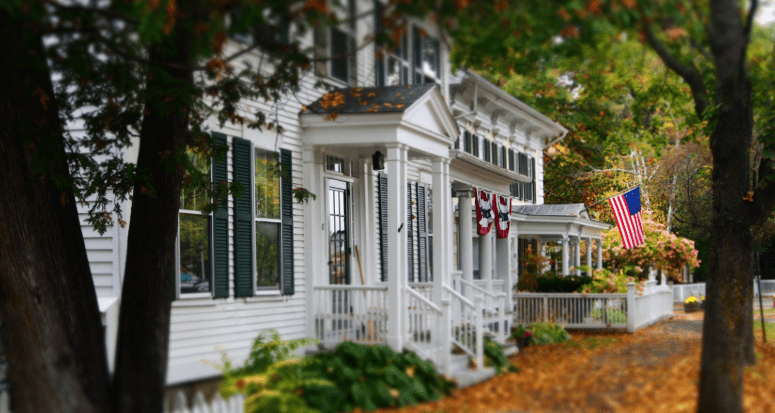How to Find Out if Someone Died in Your House
- Published on
- 14 min read
-
 Max Efrein, Contributing AuthorClose
Max Efrein, Contributing AuthorClose Max Efrein Contributing Author
Max Efrein Contributing AuthorMax Efrein is a journalist who has covered a wide array of topics, including tracking real estate trends, for both traditional newspapers and online media. He also picked up some firsthand home building experience while significantly expanding and renovating his house to accommodate his growing family.
-
 Richard Haddad, Executive EditorClose
Richard Haddad, Executive EditorClose Richard Haddad Executive Editor
Richard Haddad Executive EditorRichard Haddad is the executive editor of HomeLight.com. He works with an experienced content team that oversees the company’s blog featuring in-depth articles about the home buying and selling process, homeownership news, home care and design tips, and related real estate trends. Previously, he served as an editor and content producer for World Company, Gannett, and Western News & Info, where he also served as news director and director of internet operations.
Whether you’re buying a house, selling one, or you’re just a curious homeowner, it’s not unusual to wonder if one or more people have died on a property.
If you’re a buyer, then knowing when and how someone died at a residence may influence your purchasing decision.
When selling, this information may be something you have to disclose to potential buyers and could impact your property’s value.
And if you’re just curious about the history of your home, discovering someone died in or around the house may help explain rumors you’ve heard or feelings you’ve sensed about the property — or perhaps for some, the strange noises you hear at night.
To help you find out if someone died in your house, we consulted a top real estate agent and a real estate valuation specialist with unique knowledge on the subject.
What we came up with are nine ways to uncover the truth about your home’s history with death, as well as some general advice on what to consider when looking to buy or sell a stigmatized property.
1. Homebuyers can ask their real estate agent
Unless required by their state to disclose on-property deaths, real estate agents likely won’t go out of their way to share a home’s morbid past with you.
“When I’m listing a house, it’s never on my disclosure list or questionnaire,” says Joanne McCoy, a top-selling real estate agent in Lincoln, Nebraska, who sells 40% quicker than the average Lincoln agent. “It’s just not something that typically comes up.”
This doesn’t mean you can’t ask about it.
Not all agents will necessarily know whether or not a death has occurred on a property they’re showing, but they can likely find out if you ask them to.
Are real estate agents required to disclose deaths in a house?
In most states, real estate agents are not required to disclose information about deaths that occurred in a home or on the property. But let’s take a closer look at when the law demands disclosure and when it might be wise to inform potential buyers, even if not legally required.
Are there death disclosure laws?
States with the strictest death disclosure laws are Alaska, California, and South Dakota.
In California, if a person has died on the property in the three years prior to the sale of the home, this must be disclosed to potential buyers. In addition, if a potential buyer specifically inquires whether someone has died in the home even beyond the three years prior, the agent is required to tell them what they know.
In Alaska and South Dakota, only suicides and murders that occurred in the home in the past 12 months must be disclosed to potential buyers.
Though these states are the most transparent regarding on-property deaths, the general rule in most other states is that if someone asks about it, the agent or seller can’t obscure the truth.
“Even in non-disclosure states, that doesn’t give you the right to lie and conceal,” says Randall Bell, an expert in real estate damage economics and valuation with Landmark Research Group LLC in Dana Point, California. “So if you’re asked a question, it better be answered honestly, or you’re inviting litigation.”
When is it wise, or unwise, to disclose a death?
No matter which state you own property in, it can be a good idea to simply be upfront about a home’s complete history.
Potential buyers may not care if someone was murdered in a home’s backyard, but if it’s not disclosed and they learn about the death before closing, they may wonder what else the seller is not sharing with them and consider backing out of the deal.
On the other hand, it may be unwise to bring up a death in the home if there is no practical reason to do so. This information, which may have no bearing on the sale, could cause the buyer to have second thoughts or concerns about the property’s safety or tranquility.
A top agent who knows your market will know the disclosure laws and how to share the information if asked about it. HomeLight’s Agent Match platform is one way you can find an agent that best suits your needs.
2. Search the home’s address online
Take advantage of search engines like Google, Bing, and Yahoo. Simply search your home’s address and see what pops up.
To narrow the search, you can sort by news headlines to see if there was a crime, fire, or some other tragic event at the home’s address that resulted in a death. Keep in mind that, out of respect for the families involved, many newspapers do not report suicides that happen inside homes.
Pro search tip: When searching for an address, you can eliminate unrelated results by placing the core address information within quote marks, and leaving other words like avenue, street, or road outside the quote marks. For example, in the Google search bar, you might search, “275 Lincoln” Street, Chicago, IL.
You can also deploy this technique on social media websites like Twitter and Facebook using their built-in search bars. There are even social media pages or groups dedicated to monitoring police scanners and neighborhood chatter.
3. Ask around; talk to neighbors, librarians, local news staff
Doing some neighborhood or community sleuthing might reveal information that would otherwise be difficult to track down. Talk to your own local librarian, the editor of the community newspaper, neighbors, or HOA board members to see if the home has a history that might include someone who has passed away.
“Neighbors tend to know what’s going on,” Bell says.
4. If you’re buying, ask the homeowner
Asking the homeowner, either directly or through your agent, may have multiple benefits. They may be familiar with the home’s history, but no one has ever asked. They also may have connections to previous owners or family members who could tell you more.
In a death disclosure law state like California, asking can also trigger the requirement to go beyond the standard disclosure time period. This may reveal something interesting or troubling that you otherwise wouldn’t have found out.
McCoy experienced a scenario similar to this with one of her listings in 2021.
The home had been the scene of a newsworthy homicide in 1987, in which a man murdered his wife and kids before killing himself.
“When I met with [the homeowner], I wasn’t aware of the history, and she never brought it up,” McCoy says.
It was only after a potential buyer mentioned the murder that the seller started talking about its relevance with McCoy.
“[The seller] said, ‘I didn’t even think about it, it was so long ago. I didn’t think I needed to tell you,’” McCoy recounts.
McCoy asked her broker for advice, and they agreed the murder didn’t need to be disclosed to other potential buyers since so much time had passed since the incident.
5. Search public records
Most municipalities have a vital records office. This is where your local government keeps all of its residents’ birth and death certificates on file. If your town or city doesn’t have an office of its own, then your county likely handles those records for them.
Speak to one of the office’s clerks and ask if they can see if your address is listed as the place of death on any death certificates. Your access to this information may be restricted based on whether you live in an “open record” state like Georgia or a “closed record” state like Arizona. If you’re eligible to see the record, you’ll likely have to submit an official request and pay a nominal fee for the search.
You can also research the deaths of family members and others using the Social Security Death Index. The online database has records of every death reported to the Social Security Administration between 1962 and 2014. If you are concerned about deaths that occurred before or after this timeframe, then this resource won’t help you.
6. Search newspaper archives
News agencies and libraries often keep archives of newspapers that are free to search. Many of these entities have even taken the time to digitize their printed newspapers dating back many years.
To find any information related to deaths in your home, you’ll want to focus on obituaries, death notices, and crime reports in connection to your address or neighborhood.
Even if the newspaper you’re interested in searching for no longer exists, its digital records are likely viewable for free at one or more of the following websites:
- Library of Congress
- Google News
- Newspapers by Ancestry (with a free trial)
- Newspaper Archive (with a free trial)
7. Use the paid service diedinhouse.com
Yes, diedinhouse.com is a real website. This web-based service is available to help you find out if anyone has died in a home at any valid U.S. address.
For $11.99 per search (or slightly less if you buy search credits in bulk), diedinhouse.com can save you time and money by almost instantly providing you with house history information that may impact your decision to purchase or rent a house or reveal something about your own home address that you may not have known.
A purchased search report from diedinhouse.com will typically include:
- Deaths that occurred (murder, suicide, accidental, or natural)
- Meth or other drug activity (labs, dumpsites, chemicals, or glassware)
- Any fire-related incidents
- Names associated with the address
- Sex offender registry
- Other property information
A limitation of the website is that most of the information it provides dates after the mid-1980s due to a lack of older digitized death records. Anything that happened on a property before that point likely won’t appear in a search.
Two other paid services that don’t specifically search for deaths, but provide property history reports, are neighborwho.com and propertyscout.io.
Both specialize in owner and property data, such as deeds, liens, estimated property values, and names of previous owners.
8. Use a free service like housecreep.com
Housecreep.com is a crowdsourced database of stigmatized properties (i.e., murder houses, reportedly haunted houses, former drug labs, etc.).
The website lets you enter an address and returns a wide range of results that have some connection to the information you input.
If the property you’re interested in made news headlines at any point for some nefarious or intriguing reason, then it’s likely to appear at the top of the results.
9. If the need to know is vital, hire an investigator
There may be some situations where it’s crucial to know if someone has died in your house or another property that has intersected with your life.
If all other avenues to find such information prove fruitless, or you’d rather have someone else do the research, then hiring a professional investigator is an option.
Someone who knows the area may be best suited for the job, but you can also turn to websites like fiverr.com, freelancer.com, and upwork.com to locate a freelance researcher.
Does a death in a house impact your home sale or purchase?
This depends on the type of death.
For a typical death in a home, such as an elderly person passing away from natural causes, there is rarely ever an issue when buying or selling the property.
Suicides and homicides are another story. Both can leave a negative or unfavorable mark on the property that may decrease its desirability.
“When people go home, they want to just relax and have refuge from the crazy world,” Bell says. “To have that memory attached to the property, for a lot of people, is very disturbing.”
This can result in sellers having a difficult time finding the right buyer or buyers using the information as leverage for price negotiation.
There are also practical issues, says Bell.
“With a lot of murders, even low profile ones, you have a lot of gawking and people who will stop to look at the house,” he says. “I’ve even seen cases where people try to get into the house out of morbid curiosity, so there can be security concerns. I’ve also seen cases where there was a murder and the neighborhood kids won’t come into the house to play with the other kids, so it can disrupt your family’s lifestyle because of what is going on in terms of gossip and chatter in the neighborhood.”
What sellers should consider
If a tragic death occurred on a property you’re trying to sell, the best way to handle it in most cases is to simply be honest with potential buyers about it, Bell says.
“I see a lot of lawsuits where people brush it under the rug or conceal it and sell properties without proper disclosure,” he says. “People find out inevitably.”
It’s also important to be calm and collected during the selling process.
“Don’t get wrapped up about it or avoid the situation altogether,” Bell says.
If the death garnered some notoriety in the news, then there are some actions sellers can consider taking to reduce the attention.
“We’ve done things with different properties,” Bell says. “Like with O.J. Simpson’s property, we changed the address and we changed the façade to the point where it was just unrecognizable from its original state. Things like that can help.”
What buyers should consider
Due diligence can go a long way when looking to buy a home. Finding out if someone died on a property will inform your decision and may serve as a bargaining chip when making an offer.
Of the research steps we provided, flatly asking the seller if someone died at any point on the property is the most important, for if you later find out they lied or withheld information, then you’ve laid the foundation for a potential lawsuit.
“The main reliance is what you’re told by the seller,” Bell says.
Does a death in a home affect the property value?
Natural deaths have little to no effect on a property’s value.
Even suicides are relatively inconsequential when it comes to the price tag, Bell says.
“It’s obviously a sad situation in the lives of the families and individuals, but as far as property value, it doesn’t really have an impact,” he explains.
Where a seller’s investment will likely take a hit is with a homicide.
“It can literally range from 0% to 100%; but typically, a homicide will cause a 10% to 25% diminution of value,” Bell says.
In rare instances, however, the value of a property can instead increase following a tragic death on the premises.
“The value going up is usually attached to memorializing the site or monetizing the site,” Bell says.
An example would be the former Massachusetts home of Lizzie Borden. Her parents were brutally murdered in the house in 1892. Lizzie was initially believed to be the culprit but was acquitted in trial. The murder remains unsolved, and the home now serves as a bed and breakfast that people specifically seek out due to its troubled past.
As damaging as a homicide can be to a property’s reputation, a home’s value is primarily determined by the factors used in a home appraisal and not by events that occurred on the property. Those factors include:
- Property characteristics, such as size, condition, and building materials
- Home improvements, upgrades, and additions
- Location
- Market conditions
- Comparable property values
To get an idea of what your home is objectively worth without any stigma attached, try HomeLight’s free Home Value Estimator. The online tool uses key information provided by you and combs through millions of transactions to provide a ballpark estimate of value.
How would I feel if I bought a house and found out later there was a murder inside? It might make me second guess my decision or feel a little uncomfortable, so I suppose I myself would like to know.
 Joanne McCoy Real Estate AgentClose
Joanne McCoy Real Estate AgentClose Joanne McCoy Real Estate Agent at Woods Bros Realty Currently accepting new clients
Joanne McCoy Real Estate Agent at Woods Bros Realty Currently accepting new clients
- Years of Experience 19
- Transactions 122
- Average Price Point $301k
- Single Family Homes 110
The haunting truth
Especially when you’re dealing with older homes, there’s a good chance someone has died in or around the building at some point. Though the statistic often changes, there has been a notable increase in the percentage of deaths that occurred in the U.S. in recent decades.
According to NSC Injury Facts, 38.6% of U.S. residents died in their homes in 2022. Ten years ago, the rate was just around 20%.
Even if you have little interest in knowing, doing some research on whether someone died on a property may serve you well if you’re looking to buy or sell it at any point. Knowing the property’s history is better than finding out something gruesome occurred in the master bedroom after you’ve committed to the purchase or during the sales negotiation.
“How would I feel if I bought a house and found out later there was a murder inside?” McCoy says. “It might make me second guess my decision or feel a little uncomfortable, so I suppose I myself would like to know.”
Header Image Source: (Craig Tidball / Unsplash)








